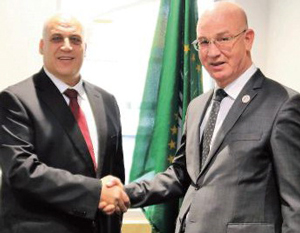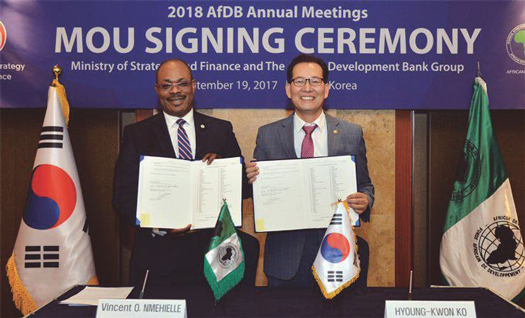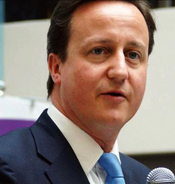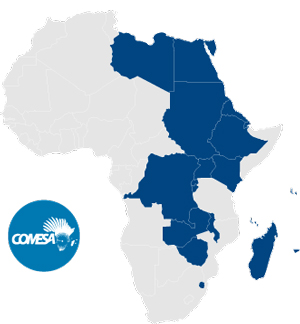Africa Watch - Peace Talks, Trade, Anti-corruption and Continental Airspace
By Jehron Muhammad | Last updated: Jun 1, 2018 - 9:10:58 AMWhat's your opinion on this article?

|
The Palestinian ambassador to Ethiopia, Dr. Nasri Abujaish, during a May 15 press conference condemning the opening of the U.S. embassy in Jerusalem, said with Ethiopia being the home of the African Union, “and the political capital of the (African) continent, we accept Ethiopia as a negotiator in the peace talks.”

African Union (AU) Commissioner for Peace and Security Smail Chergui (right) greets Palestine Ambassador, Dr. Nasri K.S Abujaish. Photo: Twitter
|
Dr. Abujaish said, “We consider the act by the U.S. as a colonial occupation of a sovereign nation and it is against all the UN Security Council and General Assembly resolutions.”
On Monday, May 14, 2018 America opened its embassy in Jerusalem, affirming recognition by President Donald Trump of Jerusalem as the capital of Israel. This has occurred despite 128-member states of the UN voting for a resolution to nullify America’s recognition of Jerusalem as the capital of Israel.
Why can’t African nations form global trade as a bloc?
The 53rd Annual Meetings of the Board of Governors of the African Development Bank and 44th Meeting of the African Development Fund met May 21-25 in Busan, Korea. The meeting opened with a call on African governments to create the right environment for the private sector to lead the continent’s industrial revolution.

Secretary-General, Vincent Nmhielle, and Korean Vice Minister of Strategy and Finance, Hyoung-Kwon Ko, display signed Memorandum of Understanding (MOU). Photo: www.afdb.org
|
Participants, noted the journal ESI Africa, advocated for a balance between the role of the state and the private sector. The host country was presented as a good model for industrialization.
“Korea’s example is incredible. Korea was as poor as any African country in the 1960s with a low per capital income. Today, thanks to the determination of its people and its commitment to industrialization, Korea is the 11th biggest economy in the world, and an example Africa should learn from,” said AfDB President, Akinwumi Adesina.
According to CNBCAFRICA, Mahammadu Sanusi II, the Emir of Kano and a former governor of Nigeria’s Central Bank, said during the AfDB meeting that Africa’s development agenda must focus on the socio-cultural and commercial interest of Africans and the upliftment of Africa’s trade and economic ecosystem.
As an economist and financial risk expert, he traced Africa’s post-colonial economic problems to the continent’s fiscal indiscipline and endemic disregard for its competitive advantages. For these reasons, he argued, Africa’s development has been limited and its global trade ties lopsided in favor of offshore trading partners.
“Nine out of every 10 countries in Africa have huge trade deficits with China, but Asia developed mostly on domestic investments and resources,” Sanusi noted, underscoring the need for African governments to invest in and promote creativity and indigenous enterprise.
Using Europe’s approach to global trade, he said the AfDB has the intellectual resources and clearly is better positioned to negotiate with China on behalf of Africa as a bloc of nations. “Europe approached global trade as a bloc so why can’t African nations do the same? This is clearly another area in urgent need of the bank’s intervention.”
The Emir also said Africa has a perception problem. “So, there is an urgent need for improved transparency, as this is clearly linked to good governance,” he said. “We need to accept that we have a perception problem that we must address. We need to tackle corruption, block leakages and create opportunities for new jobs.”
Anti-corruption agencies pledge to unify and fight corruption

Former British Prime Minister David Cameron
|
At a recent regional conference held in the Nigerian capital of Abuja, the heads of anti-corruption agencies from across Africa met to discuss strategies to overcome bottlenecks in the recovery of stolen assets, reported the French news service AFP.
The Commonwealth Africa Anti-Corruption Center advisor and lead trainer Dr.Roger Koranteng told AFP that leaders at the summit want a regional approach to recovery of stolen assets.
“There is strength in unity. If you go as a single country, you will have a problem because the countries outside the African countries are together,” he said.
The center provides training and knowledge sharing across investigations, public education and prevention, forensics, prosecution and asset tracking. Since its launch in 2013, nearly 20 anti-corruption agencies, with a total of 7,000 personal have benefited.
“Concerned about the heavy losses that Africa suffers as a result of illegal transfers of proceeds of corruption and crime out of Africa,” the anti-corruption reps vowed to “strengthen cooperation and partnership in the tracing, recovery and return of assets.”
Nigerian President Muhammadu Buhari promised to continue his war against corruption as part of his 2019 presidential re-election campaign. Earlier this year Buhari’s anti-graft chief Ibrahim Magu claimed that his agency had recovered over $1.3 billion in illicit funds.
Seamless airline airspace is coming to the African continent
African countries have historically protected their now ailing airlines through financial support and protection from competition posed by foreign airlines, reported Africa’s Business Daily.

|
Today it inched closer to a dream of “achieving seamless air travel following the move by 19 regional states to adopt an airspace agreement” amid limited fears that some airlines would be adversely affected by this move due to their weak capital base.
“Ministers of Justice and the Attorney Generals from Common Market for East and Southern Africa (Comesa) adopted the legal instrument on common airspace in Lusaka, a move that would see the cost of air transport decline by 25 percent if fully implemented.”
In a statement, Comesa said: “The Comesa Airspace Agreement and its Enabling Regulations aims at achieving a seamless upper airspace for the region which will lead to enhanced competition in the air travel and efficiency. This is in addition to reducing costs of regional air travel and providing value for money in air services.”
The seamless airspace would allow an airline to fly from its home country, pick up and drop off passengers in multiple cities in another country.
In the beginning of the year the African Union launched the Single African Air Transport Market in Ethiopia, adding incentives to a continent-wide quest to achieve open skies, said Business Daily. The launch of a common airspace has already gotten pledged commitments for 23 countries.
INSIDE STORIES AND REVIEWS
-
-
About Harriett ... and the Negro Hollywood Road Show
By Rabiah Muhammad, Guest Columnist » Full Story -
Skepticism greets Jay-Z, NFL talk of inspiring change
By Bryan 18X Crawford and Richard B. Muhammad The Final Call Newspaper @TheFinalCall » Full Story -
The painful problem of Black girls and suicide
By Charlene Muhammad -National Correspondent- » Full Story -
Exploitation of Innocence - Report: Perceptions, policies hurting Black girls
By Charlene Muhammad -National Correspondent- » Full Story -
Big Ballin: Big ideas fuel a father’s Big Baller Brand and brash business sense
By Bryan Crawford -Contributing Writer- » Full Story






 Click Here Stay Connected!
Click Here Stay Connected!








